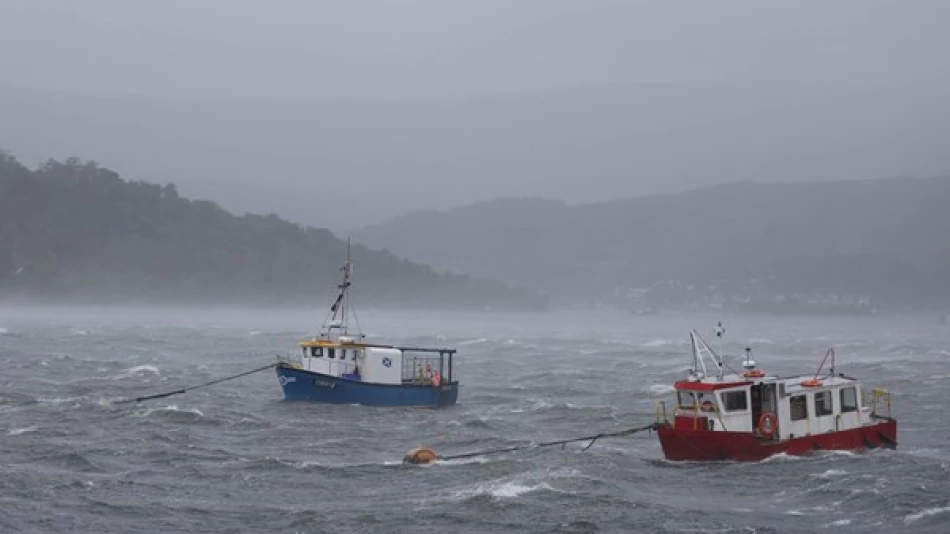
Disruptive Storm 'Flores' Cancels Events, Disrupts Rail Travel Across Scotland
Storm Floris Devastates Scotland's Peak Tourism Season with Unprecedented August Fury
Scotland's summer tourism industry took a severe hit as Storm Floris unleashed "unusually powerful" winds reaching 130 km/h, forcing the cancellation of approximately 100 performances at Edinburgh's world-renowned Fringe Festival and leaving 22,500 homes without power. The rare August storm has prompted meteorologists to issue only the second orange-level wind warning for the month since 2011, highlighting the increasing unpredictability of extreme weather events during traditionally stable summer periods.
Tourism Infrastructure Cripples Under Rare Summer Storm
The timing of Storm Floris could hardly be worse for Scotland's economy. August represents the peak of the country's tourism season, with the Edinburgh Fringe Festival alone attracting over two million visitors annually and generating hundreds of millions in economic activity. The storm's impact extends far beyond cancelled performances, with widespread transportation disruptions affecting the broader visitor experience.
Scottish rail networks experienced extensive delays and cancellations, while a fallen tree near Glasgow sparked a railway fire, creating additional safety hazards. Aberdeen Airport, a key gateway for North Sea oil operations and tourism, cancelled multiple flights, stranding passengers and disrupting business operations.
Record-Breaking Meteorological Event
The UK Met Office placed nearly all of Scotland under orange alert—the second-highest of three warning levels—as wind speeds reached 130 km/h on South Uist island in the western Hebrides. Meteorologists noted that some parts of Scotland may have recorded their highest-ever August wind speeds, underscoring the storm's exceptional nature.
This marks only the second time since 2011 that such severe wind warnings have been issued for August, suggesting that extreme weather patterns are becoming more frequent during traditionally stable summer months. The phenomenon aligns with broader climate trends affecting the North Atlantic, where shifting jet stream patterns increasingly drive unseasonable storms into northern Europe.
Economic Ripple Effects Across Multiple Sectors
The storm's economic impact extends well beyond immediate cancellations and repairs. Scotland's tourism industry, worth approximately £6 billion annually, relies heavily on August's favorable weather conditions to maximize visitor spending. The disruption affects not only large venues like the Fringe Festival but also smaller businesses dependent on consistent foot traffic.
Infrastructure Resilience Under Question
Andy Smith, head of operations for the Scottish and Southern Electricity Network, revealed that crews were conducting "summer operations similar in scale to those typically required during winter storms." This admission highlights how Scotland's infrastructure, designed primarily for winter weather challenges, struggles to cope with increasingly severe summer weather events.
The power outages affecting 22,500 homes demonstrate the vulnerability of electrical networks to extreme weather, raising questions about infrastructure investment priorities as climate patterns shift. Tourist destinations like the Isle of Skye, where high winds swept away camping trailers, face particular challenges in protecting visitors who may be unprepared for such conditions during summer holidays.
Broader Implications for UK Weather Patterns
Storm Floris represents part of a concerning trend toward more volatile summer weather across the British Isles. The storm's intensity during what should be Scotland's most stable weather period suggests that tourism operators, infrastructure managers, and emergency services may need to fundamentally reassess their seasonal preparedness strategies.
The Met Office's warning of potential record-breaking wind speeds indicates that traditional seasonal weather patterns may no longer provide reliable planning frameworks. This shift could force Scotland's tourism industry to develop more flexible booking policies and enhanced weather contingency plans, potentially increasing operational costs but improving visitor safety and satisfaction during unpredictable weather events.
Most Viewed News

 Layla Al Mansoori
Layla Al Mansoori






